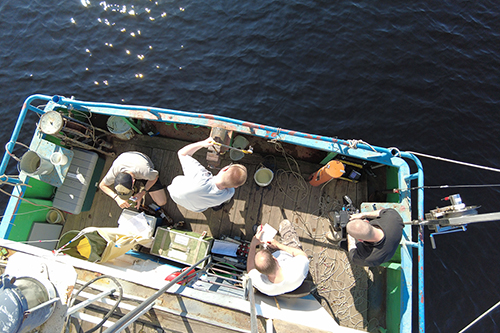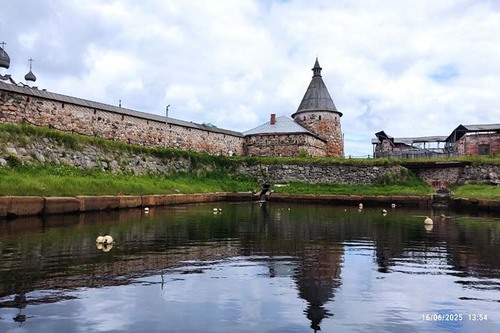In 2024, the Northern Water Problems Institute (NWPI) KarRC RAS joined the key innovative project of national importance “Unified national system for monitoring climate active substances”. The research is done by Russian scientific organization under the RITM Carbon consortium umbrella. Karelia is efficiently represented in this project by specialists from the Institute of Biology, Forest Research Institute and Department for Multidisciplinary Research KarRC RAS, who perform carbon monitoring in the republic’s terrestrial ecosystems — forests, wetlands, and man-made agricultural landscapes.
Similarly to terrestrial ecosystems, aquatic ecosystems also store carbon, which will later be released into the atmosphere. Surface waters occupy over 12% of Russia’s territory, making our country the worldwide leader in lake water reserves (30% of global resources). That is why, accurate assessment of greenhouse gas sequestration and emission by natural ecosystems is impossible without taking into account carbon fluxes in aquatic ecosystems.
— Republic of Karelia is a water abundant territory: over 61 thousand lakes and nearly 27 thousand rivers, which is why our region was chosen, together with Moscow, Siberia and the Far East, to be one of the five pioneers for working out the uniform methodological approaches, which will potentially be then extrapolated to waters in other Russian regions. Relying on the experience gained for terrestrial ecosystems, we plan to create a geographically distributed network for monitoring carbon pools and greenhouse gas fluxes in aquatic ecosystems that would cover the main representative types of water bodies and permit a reliable estimation of their capacity as greenhouse gas sinks, — tells Yulia Lukina, Research Leader, Director of the Northern Water Problems Institute KarRC RAS.
Over the course of the year, specialists in various fields - hydrochemists, hydrogeologists, hydrologists, hydrophysicists, sedimentologists, hydrobiologists, and geographers - work in the Kivach Nature Reserve on Lake Chudesnaya Lamba, the Sandalka River, and the Chechkin Brook. Scientists thoroughly investigate how much carbon is stored in the water bodies' main depositing environments: bottom sediments, water column, groundwater, biota, and estimate the rate of gas transfer along the water column so as to quantify the contribution of aquatic ecosystems to carbon emissions into the atmosphere. They have come up with original designs of sediment traps, which are necessary for the observations of the sedimentation rate, and of stationary collection chamber traps for monitoring gas emissions from sediments.
— The first project results indicate that waters of Karelia contain relatively high amounts of all forms of carbon. This provides researchers with the ground to hypothesize about the effect of boreal aquatic ecosystems on the global carbon cycle. The significance of this impact on the Earth’s climate system is yet to be evaluated, — shared Yulia Lukina.
News

June 20, 2024
Karelia among the five regions in the country developing techniques for quantifying carbon pools and fluxes in aquatic ecosystems
Our region became one of the quintet of regions where unified methodological approaches to quantifying greenhouse gas emission and sequestration by aquatic ecosystems will be worked out. The work is carried out by researchers from the Northern Water Problems Institute KarRC RAS in the Kivach Nature Reserve. The first results were obtained, which indicate that waters of Karelia contain relatively high amounts of all forms of carbon. Our colleagues told about their activities to SAMPO TV 360 crew.
Our region became one of the quintet of regions where unified methodological approaches to quantifying greenhouse gas emission and sequestration by aquatic ecosystems will be worked out. The work is carried out by researchers from the Northern Water Problems Institute KarRC RAS in the Kivach Nature Reserve. The first results were obtained, which indicate that waters of Karelia contain relatively high amounts of all forms of carbon. Our colleagues told about their activities to SAMPO TV 360 crew.
See also:

July 28, 2025
Researchers monitor the state of Lake Onego under climate change and human impact
Staff of the Northern Water Problems Institute KarRC RAS are back from an expedition that covered larger bays and deep-water regions of Lake Onego. The multidisciplinary studies both provide new data on the wellbeing of the lake ecosystem through modern analysis methods and permit tracing the changes relying on over 60-year-long own observation series. Annual monitoring is especially important for evaluating the combined effect of climate change and human impact on the lake.
Staff of the Northern Water Problems Institute KarRC RAS are back from an expedition that covered larger bays and deep-water regions of Lake Onego. The multidisciplinary studies both provide new data on the wellbeing of the lake ecosystem through modern analysis methods and permit tracing the changes relying on over 60-year-long own observation series. Annual monitoring is especially important for evaluating the combined effect of climate change and human impact on the lake.

July 24, 2025
Karelian scientists assess the consequences of human impact on Solovki ecosystem
In 2025, KarRC RAS scientists continued field surveys in Blagopoluchiia Bay, Solovetsky Archipelago, White Sea. Two expeditions have already taken place – in winter and in summer, and one more is coming in August. Scientists explore the human impact on the archipelago’s nature, both in the bay waters and on adjacent land. They have detected an unusual ice structure, collected sediment cores to assess the pollution level, described the composition of the flora in the intertidal zone and the coastal meadows.
In 2025, KarRC RAS scientists continued field surveys in Blagopoluchiia Bay, Solovetsky Archipelago, White Sea. Two expeditions have already taken place – in winter and in summer, and one more is coming in August. Scientists explore the human impact on the archipelago’s nature, both in the bay waters and on adjacent land. They have detected an unusual ice structure, collected sediment cores to assess the pollution level, described the composition of the flora in the intertidal zone and the coastal meadows.



